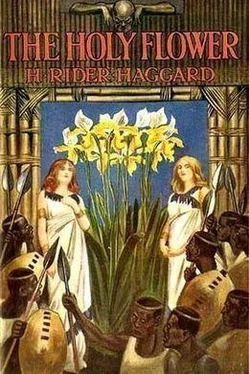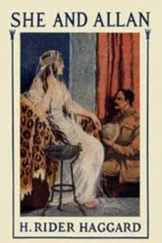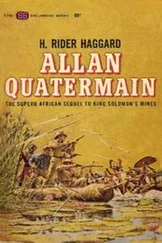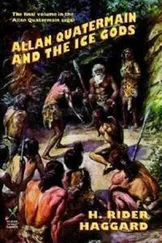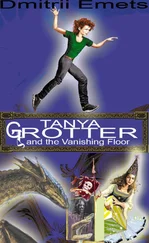These Pongo prisoners, having now no home, and not knowing where their people had gone except that it was "towards the north," asked for leave to settle among the Mazitu, which was granted them. Their story confirmed me in my opinion that Pongo–land is not really an island, but is connected on the further side with the continent by some ridge or swamp. If we had been obliged to stop much longer among the Mazitu, I would have satisfied myself as to this matter by going to look. But that chance never came to me until some years later when, under curious circumstances, I was again destined to visit this part of Africa.
To return to my story. On the day following this discussion as to our departure we all breakfasted very early as there was a great deal to be done. There was a dense mist that morning such as in these Mazitu uplands often precedes high, hot wind from the north at this season of the year, so dense indeed that it was impossible to see for more than a few yards. I suppose that this mist comes up from the great lake in certain conditions of the weather. We had just finished our breakfast and rather languidly, for the thick, sultry air left me unenergetic, I told one of the Zulus to see that the two donkeys and the white ox which I had caused to be brought into the town in view of our near departure and tied up by our huts, were properly fed. Then I went to inspect all the rifles and ammunition, which Hans had got out to be checked and overhauled. It was at this moment that I heard a far–away and unaccustomed sound, and asked Hans what he thought it was.
"A gun, Baas," he answered anxiously.
Well might he be anxious, for as we both knew, no one in the neighbourhood had guns except ourselves, and all ours were accounted for. It is true that we had promised to give the majority of those we had taken from the slavers to Bausi when we went away, and that I had been instructing some of his best soldiers in the use of them, but not one of these had as yet been left in their possession.
I stepped to a gate in the fence and ordered the sentry there to run to Bausi and Babemba and make report and inquiries, also to pray them to summon all the soldiers, of whom, as it happened, there were at the time not more than three hundred in the town. As perfect peace prevailed, the rest, according to their custom, had been allowed to go to their villages and attend to their crops. Then, possessed by a rather undefined nervousness, at which the others were inclined to laugh, I caused the Zulus to arm and generally make a few arrangements to meet any unforeseen crisis. This done I sat down to reflect what would be the best course to take if we should happen to be attacked by a large force in that straggling native town, of which I had often studied all the strategic possibilities. When I had come to my own conclusion I asked Hans and Mavovo what they thought, and found that they agreed with me that the only defensible place was outside the town where the road to the south gate ran down to a rocky wooded ridge with somewhat steep flanks. It may be remembered that it was by this road and over this ridge that Brother John had appeared on his white ox when we were about to be shot to death with arrows at the posts in the market–place.
Whilst we were still talking two of the Mazitu captains appeared, running hard and dragging between them a wounded herdsman, who had evidently been hit in the arm by a bullet.
This was his story. That he and two other boys were out herding the king's cattle about half a mile to the north of the town, when suddenly there appeared a great number of men dressed in white robes, all of whom were armed with guns. These men, of whom he thought there must be three or four hundred, began to take the cattle and seeing the three herds, fired on them, wounding him and killing his two companions. He then ran for his life and brought the news. He added that one of the men had called after him to tell the white people that they had come to kill them and the Mazitu who were their friends and to take away the white women.
"Hassan–ben–Mohammed and his slavers!" I said, as Babemba appeared at the head of a number of soldiers, crying out:
"The slave–dealing Arabs are here, lord Macumazana. They have crept on us through the mist. A herald of theirs has come to the north gate demanding that we should give up you white people and your servants, and with you a hundred young men and a hundred young women to be sold as slaves. If we do not do this they say that they will kill all of us save the unmarried boys and girls, and that you white people they will take and put to death by burning, keeping only the two women alive. One Hassan sends this message."
"Indeed," I answered quietly, for in this fix I grew quite cool as was usual with me. "And does Bausi mean to give us up?"
"How can Bausi give up Dogeetah who is his blood brother, and you, his friend?" exclaimed the old general, indignantly. "Bausi sends me to his brother Dogeetah that he may receive the orders of the white man's wisdom, spoken through your mouth, lord Macumazana."
"Then there's a good spirit in Bausi," I replied, "and these are Dogeetah's orders spoken through my mouth. Go to Hassan's messengers and ask him whether he remembers a certain letter which two white men left for him outside their camp in a cleft stick. Tell him that the time has now come for those white men to fulfil the promise they made in that letter and that before to–morrow he will be hanging on a tree. Then, Babemba, gather your soldiers and hold the north gate of the town for as long as you can, defending it with bows and arrows. Afterwards retreat through the town, joining us among the trees on the rocky slope that is opposite the south gate. Bid some of your men clear the town of all the aged and women and children and let them pass though the south gate and take refuge in the wooded country beyond the slope. Let them not tarry. Let them go at once. Do you understand?"
"I understand everything, lord Macumazana. The words of Dogeetah shall be obeyed. Oh! would that we had listened to you and kept a better watch!"
He rushed off, running like a young man and shouting orders as he went.
"Now," I said, "we must be moving."
We collected all the rifles and ammunition, with some other things, I am sure I forget what they were, and with the help of a few guards whom Babemba had left outside our gate started through the town, leading with us the two donkeys and the white ox. I remember by an afterthought, telling Sammy, who was looking very uncomfortable, to return to the huts and fetch some blankets and a couple of iron cooking–pots which might become necessities to us.
"Oh! Mr. Quatermain," he answered, "I will obey you, though with fear and trembling."
He went and when a few hours afterwards I noted that he had never reappeared, I came to the conclusion, with a sigh, for I was very fond of Sammy in a way, that he had fallen into trouble and been killed. Probably, I thought, "his fear and trembling" had overcome his reason and caused him to run in the wrong direction with the cooking–pots.
The first part of our march through the town was easy enough, but after we had crossed the market–place and emerged into the narrow way that ran between many lines of huts to the south gate it became more difficult, since this path was already crowded with hundreds of terrified fugitives, old people, sick being carried, little boys, girls, and women with infants at the breast. It was impossible to control these poor folk; all we could do was to fight our way through them. However, we got out at last and climbing the slope, took up the best position we could on and just beneath its crest where the trees and scattered boulders gave us very fair cover, which we improved upon in every way feasible in the time at our disposal, by building little breastworks of stone and so forth. The fugitives who had accompanied us, and those who followed, a multitude in all, did not stop here, but flowed on along the road and vanished into the wooded country behind.
Читать дальше
Конец ознакомительного отрывка
Купить книгу
